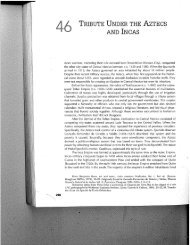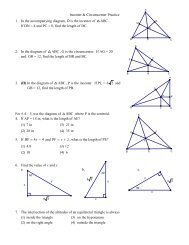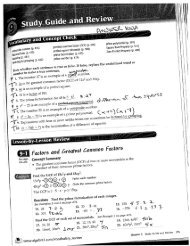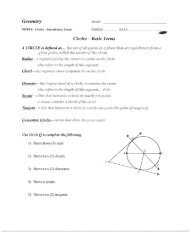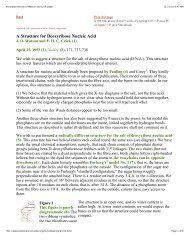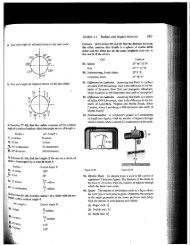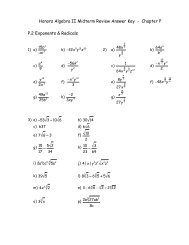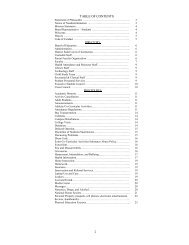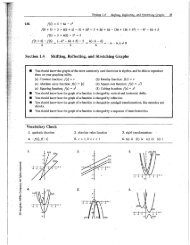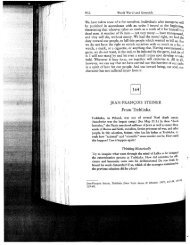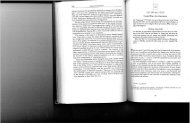Alexis de Tocqueville CRITIQUE OF THE OLD REGIME
Alexis de Tocqueville CRITIQUE OF THE OLD REGIME
Alexis de Tocqueville CRITIQUE OF THE OLD REGIME
Create successful ePaper yourself
Turn your PDF publications into a flip-book with our unique Google optimized e-Paper software.
102 Part Two Mo<strong>de</strong>rn Europe<strong>Alexis</strong> <strong>de</strong> <strong>Tocqueville</strong><strong>CRITIQUE</strong> <strong>OF</strong> <strong>THE</strong> <strong>OLD</strong> <strong>REGIME</strong> French Revolution, byThe following passage from The Old Regime and thethe role of the philosophes in un<strong>de</strong>r-<strong>Alexis</strong> <strong>de</strong> <strong>Tocqueville</strong> (1805-1859), treats ¯ .mining the Old Regime. Born of a noble family, <strong>de</strong> <strong>Tocqueville</strong> was active inFrench politics. After traveling in the United States, he wrote Democracy inAmerica (1835), a great work of historica! literature, in 1856, he published TheOld Regime and the French Revolution, which explored the causes of the FrenchRevolution.France had long been the most literary of allthe nations of Europe; although her literarymen had never exhibited such intellectual powersas they displayed about the middle of the18th century, or occupied such a position asthat which they then assumed. Nothing of thekind had ever been seen in France, or perhapsin any other country. They were nor constantlymixed up with public af~kirs as in England: atno period, on the contrary, had they lived moreapart from them. They were invested with noauthority whatever, and filled no public officesin a society crow<strong>de</strong>d with public officers; yetthey did not, like the greater part of theirbrethren in Germany, keep entirely aloof fromthe arena of politics and retire into the regmnsof pure philosophy and polite literature. Theybusied themselves incessantly with matters a~pertainingto government, and this was, mtruth, their special occupation¯ Thus they werecontinually holding forth on the origin andprimitive forms of society, the primary rightsof the citizen and of government, the naturaland artificial relations of men, the wrong orright of customary laws, and the principles oflegislation. While they thus penetrated to thefundamental basis of the constitution of theirtime, they examined its structure with minutecare and criticised its general plan.¯ . . [The thinkers of the Enlightenment} allagreed that it was expedient to substitute simpleand elementary rules, <strong>de</strong>duced from reasonand natura! law, for the complicated traditionalcustoms which governed the society of theirtime. Upon a strict scrutiny it may be seen thatwhat might be called the political philosophyof the eighteenth centur.y consisted; properlyspeaking, in this one norton.These opinions were by no means novel; forthree thousand years they had unceasingly traversedthe imaginations of mankind, thoug!~without being able to stamp themselves there¯How came they at last to take possession ,of theminds of all the writers of this period? Why,instead of progressing no farther than the headsof a few philosophers, as had frequently beenthe case, had they ar last reached the masses,and assumed the strength and the fervour of apolitica! passion to such a <strong>de</strong>gree, that generaland abstract theories upon the nature of societybecame daily topics of conversation, and eveninflamed the imaginations of women and of thepeasantry? How was it that literary men, possessingneither rank, nor honours, nor fortune,nor responsibility, nor power, became, in fact,the principal political men of the day? ¯ ¯ .It was not by chance that the phi!osophers ofthe !Sth century ¯ . ¯ coinci<strong>de</strong>d in entertammgnotions so opposed to those which still servedas bases to the society of their time: these i<strong>de</strong>ashad been naturally suggested to them by theaspects of the society which they had all beforetheir eyes. The sight of so many unjust or absurdprivileges, the {bur<strong>de</strong>n} of which was more andmore felt whilst their cause was less.and lessun<strong>de</strong>rstood, urged, or rather precipitated the
minds of one and all to the i<strong>de</strong>a of the naturalequality of man’s condition. Whilst they !ookedupon so many strange a~d irregular institutions,born of other times, which no one hadattempted either to bring into harmony witheach other or to adapt to mo<strong>de</strong>rn wants, andwhich appeared likely to perpetuate their existencethough they had lost their worth, theylearned to abhor what was ancient and traditional,and naturally became <strong>de</strong>sirous of reconstructingthe social edifice of their dayupon an entirely new plan--a plan which eachone traced solely by the light of his reason ....Had {the French} been able, like the English,gradually to modify the spirit of their ancientinstitutions by practical experience without <strong>de</strong>stroyingthem, they would perhaps have beenless inclined to invent new ones. Bur there wasnot a man who did not daily feel himself injuredin his fortune, in his person, in his comfort,or his pri<strong>de</strong> by some old law, some ancientpolitical custom, or some other remnant of formerauthority, without perceiving at hand anyremedy that he could himself apply to his ownparticular hardship. It appeared that the wholeconstitution of the country must either be enduredor <strong>de</strong>stroyed.The French, however, had still preserved oneliberty amidst the ruin of every other: theywere still free to philosophize almost withoutrestraint upon the origin of society, the essentialnature of governments, and the primordialrights of mankind.All those who felt themselves aggrieved bythe daily application of existing laws were soonenamoured of these literary politics. The sametaste soon reached even those who by nature orby their condition of life seemed the farthestremoved from abstract speculations. Every taxpayerwronged by the unequal distribution ofthe taille L was fired by the i<strong>de</strong>a that all menought to be equal; every little landowner <strong>de</strong>vouredby the rabbits of his noble neighbourChapter 4 Era of the French Revolution 103was <strong>de</strong>lighted to be told that n!l privilegeswere without distinction contrary to reason.Every public passion thus assumed the disguiseof philosophy; all political action was violentlydriven back into the domain of literature; andthe writers of the day, un<strong>de</strong>rtaking rhe guidanceof public opinion, found themselves atone time in that position which the heads ofparties commonly hold in free countries. Noone in fact was any longer in a condition tocontend with them for the part they had assumed....If now it be taken into consi<strong>de</strong>ration thatthis same French nation, so ignorant of its ownpublic affairs, so utterly <strong>de</strong>void of experience,so hampered by its institutions, and so powerlessto amend them, was also in those days the .most lettered and witty nation of the earth, itmay readily be un<strong>de</strong>rstood how the writers ofthe time became a great political power, an<strong>de</strong>n<strong>de</strong>d by being the first power in the country.Above the actual state of society--the constitutionof which was stiil traditional, confused,and irregular, and in which the laws remainedconflicting and contradictory, ranks sharplysun<strong>de</strong>red, the conditions of the different classesfixed whilst their bur<strong>de</strong>ns were unequal--animaginary state of society was thus springingup, in which everything appeared simple andco-ordinate, uniform, equitable, and agreeableto reason. The imagination of the people gradually<strong>de</strong>serted the former state of things inor<strong>de</strong>r to seek refuge in the latter. Interest waslost in what was, to foster dreams of what"might be; and men thus dwelt in fancy in thisi<strong>de</strong>al city, which was the work of literaryinvention ....This circumstance, so novel in history, of thewhole political education of a great peoplebeing formed by its literary men, contributedmore than anything perhaps to bestow uponthe French Revolution its peculiar stamp, andto cat~se those results which are still perceptible.For an explanation of taxes, see footnote ! on page 99,



